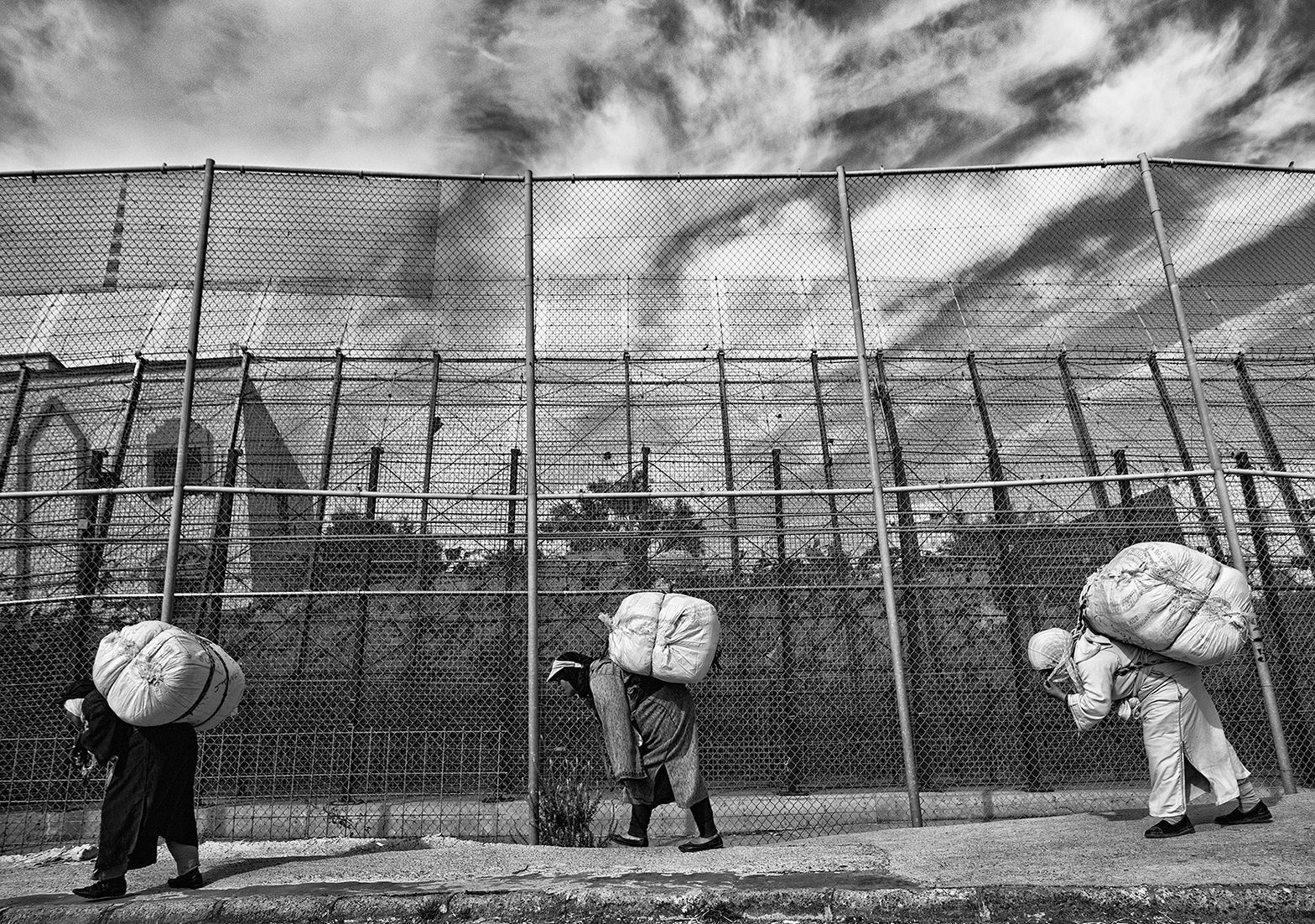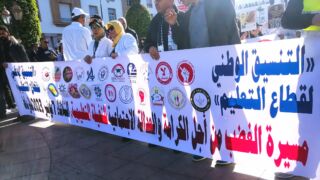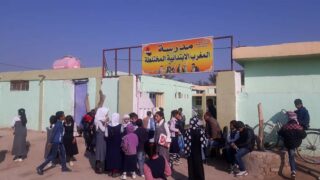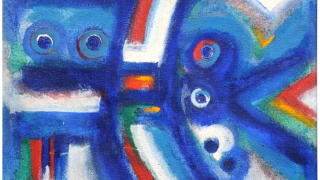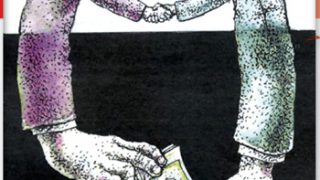
This publication has benefited from the support of the Rosa Luxemburg Foundation. This text may be reproduced in part or in full, provided the source is acknowledged.
There are the “estuaries”, the random popular markets that spread on the sidewalks of most urban streets in Morocco, and there is the source, the city of Ceuta. Between the two ends lays a long trail on which travel the many stories of the women who carry the goods all along the journey. The “Tarakhal” crossing is the narrow door through which public smuggling happens. The Moroccan city of Ceuta, occupied by Spain since six hundred years, is the one and only source of all smuggled goods. A crowd of people and smugglers all try to pass through the small gate while the police officers find themselves incapable to organize this terrible human congestion.
The Female “Mules”
Thousands of women carry huge bundles of used clothes, chocolates and other goods on their backs, comprising a shocking and peculiar sight. The mainstream media dubbed these women “the mules”, amid legal and media protests over the degrading character of the label. Even though the media stopped using this term, it remains widely common among the people.
The number of "mule", or women smugglers, is estimated to be around nine thousand. The images taken at the border before photography was banned show endless packed lines of these human carriers. These photos, in which a policeman is always standing, guiding the women, carry much significance.
One-way smuggling, from occupied Ceuta to Morocco is only the tip of the iceberg of the parallel economy which plays a substantial role in the Moroccan economy and society. Parallel economic activities take place in several domains, most notably in the real estate, a sector that “lays golden eggs”, amassing money through tax evasion and concealing the real prices from the land registry. According to a study released in April 2018 by the General Federation of Moroccan Enterprises (CGEM), the informal sector accounts for 20 percent of the gross domestic product (GDP) and 20 percent of imports, affecting 54 percent of textile and clothing activities and 26 percent of the food industry. It employs 2.4 million people, accounting for 36.3 percent of the labor market in non-agricultural sectors nationwide.
The "Gloomy" Economy of Morocco
15-07-2019
Morocco’s proximity to Europe allows a continuous flow of goods as 14 kilometers is not an obstructive distance for modern ships and speedboats. The enormous quantities of goods available in Ceuta attract women from all parts of Morocco. From the slums that surround the cities, the popular neighborhoods, the desert or the countryside, women, mostly in their fifties, choose this small trade over working in the sector of agriculture. From Ceuta, they return with their goods the same way they arrived, in trucks and buses, sleeping overnights on the road. Whenever one of these vehicles is stopped for inspection, a driver's assistant talks to the gendarmerie to “reassure” them.
The practice of these women is also called "smuggling for livelihood”, according to the official sterile term. The goods they carry reach countless “estuaries”. They are sold in popular markets where sidewalks function as open-air shops, displaying Western non-Moroccan brands, and proposing various products such as sheets, shoes, cheese and nail polish.
This type of smuggling is the most obvious form of parallel economy. It is a "terrestrial" economy, affected by factors of weather, dust and congestion. The so-called "souks of the north" that spread over Moroccan cities, from the giant Casablanca to the small Tiflet (70 kilometers east of Rabat), are difficult to penetrate. In all these places, the mothers are the breadwinners , the youth is unemployed, and " solidarity" means that a woman provides daily bread for the many members of the family.
What Makes the Informal Sector "Necessary”?
The answer is the weak purchasing power of the people, the lack of job opportunities and the prevalence of "disguised unemployment" that is the seasonal temporary self-employment.
The name most widely used for the informal sector is " the black economy”. It involves goods of unknown origin which lack proper documentation from the manufacturer. In unauthorized production units, unregistered in the commercial register, money is paid and received outside the banking system and commercial transactions are conducted in arbitrary spaces. This sector evades taxes and the individuals who work in it have no health coverage or retirement pensions. The informal sector’s activities are found everywhere: in the ten-dollar smuggled piece of clothes that is being sold on the sidewalks, in the hard currency trade of the young people who stand on Rabat’s street corners whispering “exchange, exchange!”, and in the “Ain Harouda” villages in the North of Casablanca, where covert factories load trucks with goods worth hundreds of thousands of dollars. The luxurious cars, roaming in the villages of “Ain Harouda” is a good indicator of the popularity of those contraband products in the markets of the country . It is clear that the authorities are aware of the whole process yet choose to ignore it. All of these activities are ways of earning a living in a world of “each -for-himself”.
It is difficult to dissect all forms of informal economy in Morocco which has a pronounced aversion to investigative journalism. However, the case of the women porters can be observed as it floats back on the different media outlets whenever a tragic death by overcrowding incident occurs at the Ceuta crossing.
Small capitals cannot afford a slow economic cycle, so the women try to liquidate their goods as quickly as possible in the “estuaries”. In the markets, they sit patiently for long hours on the sidewalk or against a wall, trying to sell whatever is in their possession.
Smuggling is Not a Coincidence
Occupying a street space for selling goods is permitted by “oral agreement”, and the same goes for smuggling. Sometimes, smuggled goods are confiscated in cities in the heart of Morocco, a thousand kilometers from the border. No one asks how those products got there in the first place, or why these goods in particular are being confiscated, and not others elsewhere. These random operations are often interpreted as a selective punishment against a particular group for failing to perform certain tasks. For example, the smuggling of computers has decreased since the outbreak of Al Hoceima protests. Law enforcement was suddenly needed.
The economic activity of smuggling is not “new” in Morocco as it has been practiced since the end of the nineteenth century. Until the last quarter of the twentieth century, smuggling was directed towards the elite who needed expensive forbidden goods, like whiskey. Though, at the end of the twentieth century, these goods became legal and international brands opened branches in Morocco, reducing the profitable smuggling business. Of course, the elite would not smuggle second-hand clothing, but rare and expensive goods. What remained was the smuggling-for-livelihood, practiced by the poor women.
For the tax collector, the informal economy is “black”. The money is not detected by the banks and the capitals and debts are placed outside all financial institutions for fear of going through the banking systems. Statistically, every year since 2007, about 40 thousand unregulated production units are founded in the informal sector in Morocco and the number of transactions made in the unorganized sector have been increasing annually by 6.5 percent since then. Occupations in trade and commerce remain the most profitable for unregulated entrepreneurs. Hence, The General Federation of Moroccan Enterprises (CGEM, the employers' union) has called on the government to integrate the parallel economy into the structured economy.
Why Does Smuggling Continue to Thrive?
Moroccan consumers regard every product from a foreign brand as being of good quality, rendering the Moroccan market an encouraging environment for smuggling. Women left at the mercy of their economic situations, in deep poverty, without education or resources, participate, in whichever way they can, in the smuggling activities. In Morocco, more than ninety percent of all property is registered in the names of men, meaning that women (half of the society) own only about five percent of the overall wealth.
In addition, unemployment is widespread in Morocco.
An official report recommended that the government should provide 400 thousand jobs every year in all fields, but the economy currently provides only 200 thousand jobs. Therefore, there are 200 thousand people who must manage in other ways and it is needless to say that this has consequences.
King Mohammed VI himself declared the failure of the Moroccan model to produce a fair distribution of wealth. This "model" was established and launched in the hope of remedying to some “flaws” revealed by the Arab Development Report in 2003. Fifteen years later, the king announced that Morocco had to adopt an alternative development model. Mohammed VI's description and evaluation of the economic situation was more accurate than that of the Moroccan opposition.
The Link between Protests and Smuggling Control
What is the most obvious manifestation of failure? The well-known story repeats itself: Suddenly, in an unexpected place in Morocco, protests erupt, resulting in confrontations, destruction of public property, fires, burned cars, mass arrests, and marathon trials that end without verdicts. Many condemn the events while raising an incredulous question: why does the Moroccan citizen who is sane, peaceful and well resort to such violent actions?
For instance, after fences were erected at the Algerian border halting the smuggling there, unrest in eastern Morocco increased rapidly. The newspapers published that "Moroccans demanded jobs after cross-border smuggling with Algeria was prevented." In this case, the smuggling of gasoline, usually practiced by men, was prohibited.
The citizens demanded that the state either ignores the smuggling or provides jobs for the people, but the state did not heed the second request. Thus, it seems that the Moroccan government is deemed to choose between finding employment for young people, allowing them to migrate (Harraga), or letting them smuggle goods.
On October 28th of 2016, a young man was killed in a truck in Al Hoceima, igniting a protest movement in the area, where social demands and feelings of persecution on a regional basis were intertwined. The victim was a fish smuggler who sold illegal product outside of the regulated fish market. This information was ignored because smuggling is an eminent reality in Morocco.
When the police intervene to enforce the law, the street sellers usually organize a protest in which they raise pictures of the king to avoid any possible collisions. In the quiet days, the police is considered to be a loose device of control. At the gates of occupied Ceuta, smuggling is permitted yet photography is forbidden.
There is yet another unconventional mode of protest. Smuggling had declined by the end of 2017 and the beginning of 2018 due to a long winter hiatus. Small capital, however, cannot afford to stop its circulation and always needs a small cycle. Moroccan newspapers reported that protesters had marched in the occupied city of Ceuta because of the diminishing smuggling activity, causing chaos and overcrowding and asking for the return of the women smugglers to sell their goods. Morocco’s geographic location is an asset in itself, and this reduces the possibility of a collapse in the situation of Ceuta which survives on smuggling. The Spanish Government responded to the protestors’ demands in April and began the construction of a maritime gateway between occupied Ceuta and Morocco to circumvent the overcrowding at the sole crossing point. Women smugglers will eventually adapt to the situation by creating other ways to reach the goods to-be-smuggled, and carry on their “business-as-usual”.
The content of this publication is the sole responsibility of Assafir Al-Arabi and Rosa Luxemburg Foundation cannot accept any liability for it.
Translated from Arabic by Sabah Jalloul
Published in Assafir Al-Arabi on 17/04/2018

